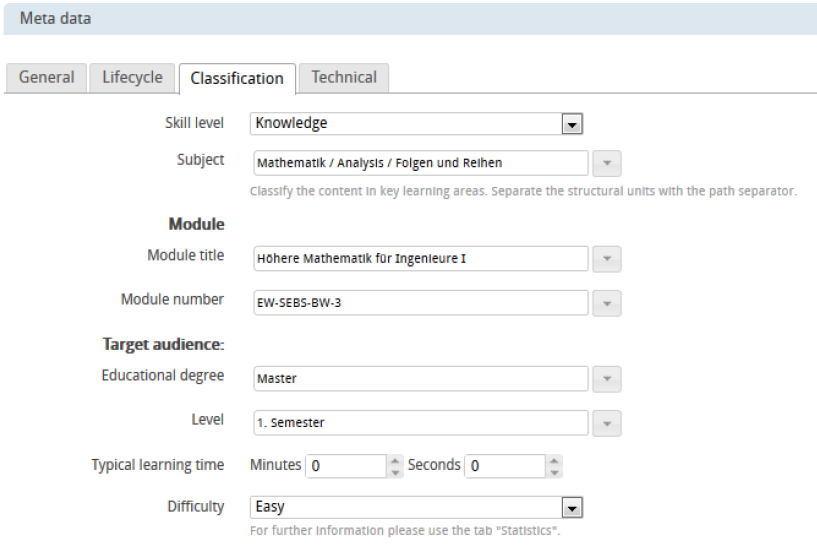Standardkompatibilitaet
IMS QTI
Die konzeptionelle Basis der ONYX Testsuite bildet die weltweit anerkannte IMS Question and Test Interoperability (QTI) Spezifikation 2.1. Fast alle wertvollen Funktionalitäten der Onyx Testsuite gehen auf diesen Standard zurück. Neben der Austauschbarkeit der Inhalte werden durch den Einsatz von QTI weitere Vorteile erreicht. Die strikte Trennung von Inhalt und Layout und die XML-basierte Abbildung der gesamten Test- und Aufgabeninhalte sind Grundlage für die Unabhängigkeit vom Endformat und die Möglichkeit, existierende Inhalte nachträglich zu bearbeiten. Die IMS QTI Spezifikation sieht einen Austausch der Testinhalte als IMS Content Package vor. Dieses Dateiarchiv enthält zusammengefasst alle Testdaten, die LOM-Metadaten und enthaltene Medien. Formeln werden innerhalb der Testdaten in MathML-Notation beschrieben.
Neben der standardkonformen Speicherung der Testdaten speichert ONYX auch die Ergebnisdaten IMS QTI konform. Die IMS QTI Report-Datei enthält alle Testauswertungsdaten, inklusive der Lernerantworten, Zeitstempel und erreichten Punkte. Bei einer manuellen Bewertung wird die Ergebnisdatei erweitert, wodurch auch der Bewertungsverlauf nachvollziehbar ist. Ebenfalls ist ein CSV-Export der Ergebnisse möglich.
Der ONYX Editor bietet Möglichkeiten zum Import und Export von Testdaten in andere Formate, so auch IMS QTI v1.2. IMS QTI v1.2 wurde sehr heterogen von den Systemherstellern umgesetzt, so das Import und Export systemspezifisch sind. Geprüft wurde der IMS QTI v1.2 Import für Blackboard, WebCT und OLAT. Um die erstellten Testdaten auch in papierbasierten Testszenarien einzusetzen, steht ein PDF-Export im ONYX Editor zur Verfügung. Darüber hinaus wurden bereits verschiedene Konvertierungen für proprietäre Formate realisiert.

IEEE LOM
ONYX unterstützt große Teile des offenen IEEE Learning Object Metadata (LOM) Standards. Die Metadatenbeschreibung erfolgt damit in XML-Notation im IMS Manifest der Testdaten. Welche Metadaten im ONYX Editor dem Autor tatsächlich angezeigt werden, kann in einer Metadatenkonfiguration festgelegt werden.
Standard Metadatenprofil

Spezifisches Metadatenprofil
IMS QTI
The globally recognised IMS Question and Test Interoperability (QTI) specification 2.1 forms the conceptual basis of the ONYX Testsuite. Almost all valuable functionalities of the Onyx Testsuite rely on this standard. In addition to the interchangeability of contents, the use of QTI offers several further advantages. The strict separation of content and layout as well as the XML-based mapping of all test and task contents lay the foundations for both an independent final format and the possibility to edit existing contents. The IMS QTI specification provides that the test contents are replaced in the form of an IMS content package. This file archive contains a summary of all test data, the LOM metadata, and all included media. Formulas are described in MathML-notation within the test data.
In addition to the standard-compliant storage of the test data, ONYX also stores the result data in accordance with IMS QTI. The IMS QTI report file contains all test evaluation data, including the learner responses, time stamp, and points gained. In the case of a manual evaluation, the result file will be expanded, which also enables a transparent and understandable evaluation process. A CSV export of the results is further possible.
The ONYX editor offers the possibility to import and export test data to other formats such as IMS QTI v1.2. The system manufacturers gave IMS QTI v1.2 a very heterogeneous design, which is why the import and export is system-specific. The IMS QTI v1.2 import has been tested for Blackboard, WebCT, and OLAT. To be able to use the created test data also in paper-based test scenarios, the ONYX editor additionally contains a PDF export. Beyond that, various conversions for proprietary formats have been realised so far.

IEEE LOM
ONYX supports large parts of the open IEEE Learning Object Metadata (LOM) standard. The metadata are thus described in XML notation in the test data’s IMS manifest. Which metadata are actually displayed to the author in the ONYX editor can be determined via a metadata configuration.
Standard metadata profile
